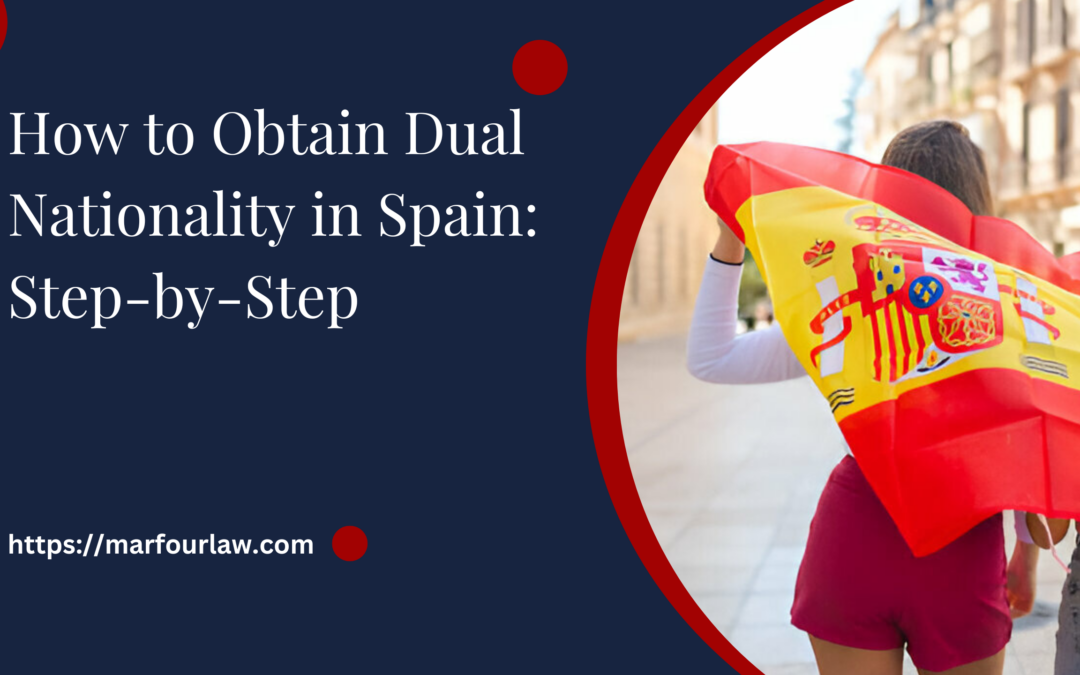Are you considering Dual Nationality in Spain? Spain permits individuals to hold dual citizenship, allowing you to be a citizen of Spain alongside another country, such as the United States.
Specific requirements must be met to obtain Spanish citizenship, including residency periods, language proficiency, and cultural integration tests.
Understanding these criteria and the application process is crucial if you’re exploring becoming a Spanish citizen while maintaining citizenship in another country.
Exploring Dual Nationality in Spain: Rights, Requirements, and Opportunities
Dual citizenship, or dual nationality, refers to the legal status of being a citizen of two countries simultaneously. In Spain, this means individuals can hold Spanish citizenship alongside citizenship from another country, such as the United States.
This status allows individuals to enjoy the rights and privileges of citizenship in both countries, which can be particularly advantageous for those with international ties or interests.
Benefits Of Dual Nationality in Spain
Dual Nationality in Spain provides individuals with a range of benefits and opportunities:
- Rights of Residence: As a dual citizen of Spain, you have the right to live and work freely in Spain and other European Union countries. This facilitates mobility within the EU, making pursuing career opportunities or retirement in Spain easier while maintaining ties with your country of origin.
- Social Benefits: Dual citizens are entitled to social security benefits, healthcare, and education in Spain. These ensure access to essential services and support their well-being and that of their family members.
- Cultural Identity: Holding dual citizenship allows you to preserve and celebrate your cultural heritage from Spain and your other country of citizenship. It enables you to participate fully in cultural activities, maintain language skills, and pass on traditions to future generations.
- Ease of Travel: Dual citizenship often simplifies travel arrangements between Spain and your other country of citizenship. It may eliminate the need for visas or reduce bureaucratic hurdles, enhancing convenience for business travel, family visits, or leisure purposes.
Importance of Dual Citizenship
Dual citizenship is highly significant for several reasons:
- Family Connections: Dual citizenship allows families to maintain strong ties across borders. It enables spouses, children, and extended family members to live together in Spain or travel freely between countries without restrictions imposed by nationality.
- Career Opportunities: Holding dual citizenship expands your career horizons. It provides access to a broader job market in Spain and across the EU, enhancing your professional prospects and increasing your earning potential.
- Investment and Property Ownership: Dual citizens can invest in property and engage in economic activities in Spain without facing the same restrictions as non-citizens. This promotes economic growth and contributes to local communities while diversifying personal investment portfolios.
- Political Rights: Dual citizens often enjoy political rights in both countries, such as voting and participating in elections. This allows you to actively engage in civic life and contribute to the democratic processes of Spain and your other country of citizenship.
In summary, Dual Nationality in Spain offers unique advantages that strengthen personal, familial, economic, and cultural ties across borders.
Understanding the requirements and benefits of dual citizenship can help individuals make informed decisions about pursuing or maintaining dual nationality status.
Legal Framework and Policies: Understanding Spain’s Approach to Dual Citizenship
Spain’s laws and policies regarding dual citizenship are pivotal in shaping the legal framework for individuals seeking citizenship in Spain alongside another country.
These regulations define the rights and obligations of dual citizens and outline the procedures and criteria for acquiring and maintaining dual nationality.

Spain’s Laws on Dual Citizenship
Spain permits dual citizenship, allowing individuals to hold Spanish citizenship while also being citizens of another country, such as the United States.
The legal basis for Dual Nationality in Spain is established under Spanish nationality laws, which govern the acquisition, loss, and restoration of citizenship status.
These laws set out specific conditions under which individuals can apply for and retain dual nationality, including residency requirements, language proficiency, and cultural integration tests.
International Agreements and Treaties
In addition to its domestic laws, Spain is also bound by various international agreements and treaties that impact its approach to dual citizenship. These agreements often involve reciprocal arrangements with other countries regarding recognizing and treating dual nationals.
For instance, Spain may have bilateral or multilateral treaties with certain countries that govern taxation, military service obligations, and social security benefits for dual citizens.
Impact on Global Mobility
Understanding Spain’s legal framework and international agreements is crucial for individuals considering dual citizenship, as it influences their rights and privileges both within Spain and internationally.
These legal considerations can affect residency rights, access to healthcare and social services, and the ability to travel freely between countries without visa restrictions.
Marfour’s Expertise in Dual Citizenship Matters
At Marfour Law Firm, we specialize in navigating the complexities of Dual Nationality in Spain. Our team of legal experts provides comprehensive guidance on Spanish nationality laws, international agreements, and the practical implications for individuals seeking dual citizenship.
Whether you’reexploring the benefits of dual nationality or needing assistance with the application process, Marfour offers tailored legal solutions to meet your needs.
Ensuring Compliance and Understanding
By staying abreast of Spain’s evolving legal landscape and international commitments, Marfour ensures that clients receive accurate advice and strategic guidance on dual citizenship matters.
Our firm’s commitment to excellence and client satisfaction underscores our reputation as leaders in the field of immigration and nationality law in Spain.
Eligibility and Requirements: Key Factors for Dual Nationality in Spain
Dual Nationality in Spain is governed by specific eligibility criteria that applicants must meet to qualify for Spanish citizenship alongside another nationality. Understanding these requirements is essential for individuals seeking to acquire dual citizenship status.

Residency Requirements
Applicants typically need to fulfill residency requirements to be eligible for Dual Nationality in Spain. The specific duration of residency varies based on different circumstances, such as:
- Standard Residency: Generally, applicants must have continuously legally resided in Spain, ranging from one to ten years, depending on factors such as employment status, family ties, or investment activities.
- Marriage to a Spanish Citizen: Spouses of Spanish citizens may qualify for accelerated citizenship after residing legally in Spain for one year.
- Exceptional Circumstances: Certain exceptional circumstances, such as extraordinary contributions to Spanish culture, science, or economics, may warrant an exception to standard residency requirements.
Language Proficiency
Proficiency in the Spanish language is a fundamental requirement for Dual Nationality in Spain. Applicants typically need to demonstrate their proficiency through:
- Language Exams: Taking and passing a language proficiency exam, such as the DELE (Diploma in Spanish as a Foreign Language), administered by the Instituto Cervantes.
- Exceptions: Some applicants, such as those from Spanish-speaking countries or individuals married to Spanish citizens, may be exempt from language proficiency requirements.
Financial Stability Criteria
Financial stability criteria are also considered in the dual citizenship application process:
- Income Requirements: Applicants may need to demonstrate a stable income or financial resources to support themselves and their dependents while residing in Spain.
- Tax Compliance: Compliance with Spanish tax laws and regulations is essential, including providing proof of tax payments and financial transparency.
- Investment and Economic Contribution: Individuals making significant investments in Spain, such as property ownership or business ventures, may demonstrate financial stability through economic contributions to the country.
Understanding and fulfilling these eligibility criteria and requirements are crucial steps towards acquiring Dual Nationality in Spain. Applicants should consult with legal experts, such as those at Marfour Law Firm, to navigate the complexities of these requirements and ensure a smooth application process.
Application Process for Spanish Citizenship: Navigating the Steps
Applying for Spanish citizenship is a structured process that involves several steps and requires careful preparation to ensure compliance with all requirements. Here’s a comprehensive guide to help you understand each stage, from the initial assessment to the final decision.

Step-by-Step Application Guide
1. Initial Assessment and Eligibility Check:
Before initiating the application process, assessingit’s your eligibility for Spanish citizenship is crucial. Key factors to consider include:
- Residency Requirements: Determine if you have legally resided in Spain for the required period, which typically ranges from one to ten years, depending on various circumstances, such as marriage to a Spanish citizen or exceptional contributions to Spain.
- Language Proficiency: Ensure you meet the language proficiency requirements by providing evidence of passing the Spanish language proficiency exam, such as the DELE (Diploma in Spanish as a Foreign Language).
- Other Criteria: Evaluate any additional eligibility criteria specific to your situation, such as financial stability or exceptional circumstances that may warrant expedited processing.
Consulting with legal experts, such as those at Marfour Law Firm, can help clarify eligibility criteria and address any concerns before applying.
2. Gather Required Documentation:
To support your application, gather and organize the following essential documents:
- Personal Identification: Provide a valid passport or national identity card.
- Proof of Residency: Submit documents proving your legal residency in Spain, such as residence permits or registration certificates, covering the required period.
- Birth and Marriage Certificates: Include original or certified copies of birth certificates for yourself and any dependent family members. If applicable, provide marriage certificates to verify marital status.
- Language Proficiency: Include documentation of your Spanish proficiency, typically through the DELE certificate or other recognized language tests.
- Background Checks: Provide certificates of good conduct and criminal record checks from your country of origin or any other country where you reside.
- Financial Documents: Demonstrate financial stability through tax returns, employment contracts, or proof of sufficient funds to support yourself and your dependents in Spain.
- Exceptional Circumstances: Include any additional documents that support your eligibility, such as proof of extraordinary contributions to Spanish culture, science, or economics.
3. Submit Your Application:
Once you have gathered all the required documentation, prepare your application package meticulously. Ensure all forms are completed accurately, and all supporting documents are organized and included.
Submission Authority: Submit your application to the competent authority responsible for processing citizenship applications. Depending on your circumstances and location within Spain, this may be the Ministry of Justice, civil registry office, or other designated government agency.
4. Application Review and Processing:
Upon submission, your application undergoes a thorough review by Spanish authorities. The review process typically includes:
- Document Verification: Authorities verify the authenticity and completeness of submitted documents.
- Additional Requests: They may request further documents or information to clarify details or address specific aspects of your application.
5. Interview or Appointment (if required):
Depending on the complexity of your application or specific circumstances, you may be required to attend an interview or appointment with immigration officials. The purpose of the interview is to:
- Assess Integration: Evaluate your integration into Spanish society, including knowledge of Spanish culture, customs, and societal norms.
- Clarify Details: Discuss any aspects of your application that require further explanation or verification.
Prepare thoroughly for the interview by reviewing your application details and familiarizing yourself with Spanish laws and customs.
Required Documentation
Ensure you have gathered all necessary documentation to support your application:
- Personal identification: Passport or national ID card.
- Proof of legal residency: Residence permits or registration certificates.
- Birth and marriage certificates: Original or certified copies.
- Language proficiency certificate: DELE or equivalent.
- Certificates of good conduct: Criminal record checks.
- Financial documents: Evidence of financial stability.
Application Fees and Processing Time
- Fees: Pay the required application fees, which vary based on age, residency status, and specific circumstances. Fees are typically non-refundable and must be paid at the time of application submission.
- Processing Time: The processing time for Spanish citizenship applications can vary significantly, ranging from several months to over a year. Factors influencing processing time include the complexity of your case, the current workload of authorities, and any additional documentation requests.
Navigating the application process for Spanish citizenship requires meticulous attention to detail, thorough preparation, and compliance with all requirements and deadlines.
Seeking guidance from experienced legal professionals, like those at Marfour Law Firm, can streamline the process and ensure a successful outcome for your citizenship application in Spain.
Comparative Analysis with Other Countries: Dual Citizenship Policies
Dual citizenship policies vary widely across the EU and globally, reflecting diverse legal, cultural, and geopolitical considerations.
For individuals considering or holding dual nationality, navigating these policies requires thorough research, adherence to legal requirements, and potentially seeking guidance from legal experts familiar with international citizenship law, such as those at Marfour Law Firm.

Dual Citizenship Policies in the EU
The European Union (EU) consists of member states with varying policies regarding dual citizenship. While each member state has its regulations, some overarching principles and trends can be identified:
- Recognition of Dual Citizenship: Most EU member states recognize dual citizenship, allowing individuals to hold citizenship from their country of birth or origin and another EU member state.
- Freedom of Movement: Dual citizenship facilitates freedom of movement within the EU. Citizens holding dual nationality can live, work, and study in any EU member state without restrictions related to nationality.
- Harmonization and Coordination: The EU promotes harmonization and coordination of citizenship policies to ensure consistency and facilitate integration across member states. This includes mutual recognition of rights and obligations for dual citizens.
- Exceptions and Special Cases: Some EU countries may have specific exceptions or restrictions regarding dual citizenship, particularly those related to national security, military service, or political office.
- Impact of Brexit: The United Kingdom’s exit from the EU has led to changes in dual citizenship policies between the UK and EU member states, requiring individuals to review and potentially adjust their citizenship status.
Dual Citizenship Policies Globally
Beyond the EU, dual citizenship policies vary significantly among countries worldwide:
- Permissive Policies: Many countries, like Canada, the United States, Australia, and New Zealand, generally allow dual citizenship without significant restrictions. This policy encourages cultural diversity, facilitates global mobility, and supports economic ties.
- Restricted Policies: Some countries, such as China and India, limit or do not recognize dual citizenship. Individuals may be required to renounce their original citizenship when acquiring another nationality or face limitations on rights and privileges as dual citizens.
- Regional Variations: Dual citizenship policies can also vary within regions. For example, countries in Latin America often have permissive dual citizenship policies, while countries in the Middle East and North Africa may have more restrictive or complex regulations.
- International Treaties and Agreements: Bilateral or multilateral treaties between countries can impact dual citizenship policies by establishing rules for the recognition, rights, and obligations of dual nationals. These agreements aim to facilitate international cooperation and protect the rights of citizens residing abroad.
- Legal Implications: Understanding the legal implications of dual citizenship is crucial, as it can affect matters such as taxation, military service obligations, and eligibility for public office in both countries of citizenship.
FAQs
Can I hold Dual Nationality in Spain and another country?
Yes, Spain allows dual citizenship, meaning you can hold Spanish citizenship and citizenship from another country.
Does Spain allow dual citizenship with us?
Yes, Spain allows dual citizenship with the United States. This means individuals can hold citizenship in both countries simultaneously, enabling them to enjoy the rights and privileges of both Spanish and American citizenship. Dual citizens must comply with the respective laws and obligations of each country, including taxation and military service requirements if applicable.
What are the residency requirements for Dual Nationality in Spain?
The residency requirements vary depending on factors such as marital status to a Spanish citizen or exceptional contributions to Spain. Typically, you must have legally resided in Spain for a specified period, ranging from one to ten years.
Do I need to speak Spanish fluently to apply for Dual Nationality in Spain?
Yes, proficiency in Spanish is generally required. Applicants must demonstrate their language skills by passing a recognized exam, such as the DELE (Diploma in Spanish as a Foreign Language).
How long does it take to process a dual citizenship application in Spain?
Processing time can vary widely, ranging from several months to over a year. Factors influencing processing include your case’s complexity, the authorities’ current workload, and any additional documentation requests.
Are there any restrictions on Dual Nationality in Spain?
While Spain generally allows dual citizenship, there may be specific restrictions or considerations related to national security, military service obligations, or political office.
Conclusion
Dual Nationality in Spain allows individuals to enjoy the benefits of being Spanish citizens and citizens of another country. It facilitates travel within the EU, access to social services, and cultural connections while requiring compliance with residency, language proficiency, and documentation requirements.
Seeking guidance from legal experts like Marfour Law Firm ensures a smooth application process and adherence to Spanish regulations, making dual citizenship valuable for personal and professional opportunities.

